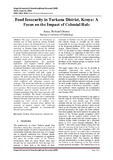Food Insecurity in Turkana District, Kenya: A Focus on the Impact of Colonial Rule
Abstract
This paper examines the contribution of
colonial rule to food insecurity among Turkana
pastoralists living in the Turkana District in the arid
zone of north-western Kenya. It is argued that food
insecurity in Turkana began during the colonial
period. For instance, during that period, the aim was
to pacify Turkana pastoralists and to ensure peace
and order. This tendency had several implications. It
tended to present the Turkana people as an
unreliable people prone to violence and, hence, to
propagate depastoralisation. Of particular
importance were negative colonial policies in
relation to land. The policy emphasized on drawing
of political boundaries and creation of block grazing
schemes. Borders were fixed, and access to key
resources were curtailed with little regard to
seasonal variation and the needs of the people for
pasture. The policy also placed the integral Turkana
tribal land area under more than one political entity,
which conflicted with indigenous resource use
strategies. This meant that within the new fixed tribal
boundaries, the environment was placed under more
severe pressure. These measures greatly affected the
transhumant patterns already mastered by the
Turkana pastoralists from their long experience with
ecological hardships. The border restriction also
destroyed the lubricating social rubric traditionally
obtained through trade and intermarriages with the
neighbouring tribes. Levels of conflicts over
available resources increased hence affected the
resilience of pastoral systems, thus rendering
pastoralists more vulnerable to environmental
hazards such as drought.
Collections
- Journal Articles (BE) [333]

